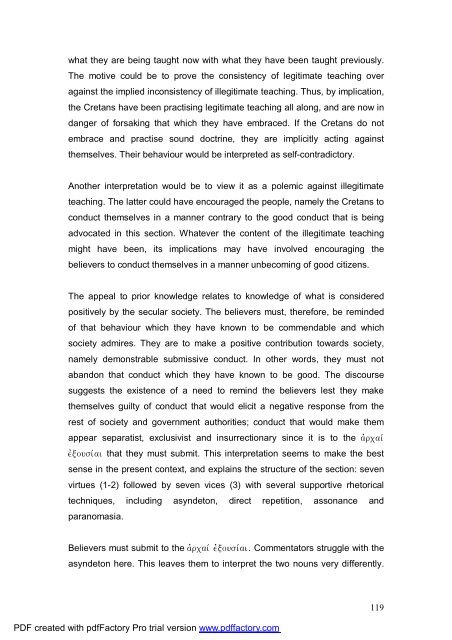A Text centred rhetorical analysis of Paul's Letter to Titus
A Text centred rhetorical analysis of Paul's Letter to Titus
A Text centred rhetorical analysis of Paul's Letter to Titus
Create successful ePaper yourself
Turn your PDF publications into a flip-book with our unique Google optimized e-Paper software.
what they are being taught now with what they have been taught previously.<br />
The motive could be <strong>to</strong> prove the consistency <strong>of</strong> legitimate teaching over<br />
against the implied inconsistency <strong>of</strong> illegitimate teaching. Thus, by implication,<br />
the Cretans have been practising legitimate teaching all along, and are now in<br />
danger <strong>of</strong> forsaking that which they have embraced. If the Cretans do not<br />
embrace and practise sound doctrine, they are implicitly acting against<br />
themselves. Their behaviour would be interpreted as self-contradic<strong>to</strong>ry.<br />
Another interpretation would be <strong>to</strong> view it as a polemic against illegitimate<br />
teaching. The latter could have encouraged the people, namely the Cretans <strong>to</strong><br />
conduct themselves in a manner contrary <strong>to</strong> the good conduct that is being<br />
advocated in this section. Whatever the content <strong>of</strong> the illegitimate teaching<br />
might have been, its implications may have involved encouraging the<br />
believers <strong>to</strong> conduct themselves in a manner unbecoming <strong>of</strong> good citizens.<br />
The appeal <strong>to</strong> prior knowledge relates <strong>to</strong> knowledge <strong>of</strong> what is considered<br />
positively by the secular society. The believers must, therefore, be reminded<br />
<strong>of</strong> that behaviour which they have known <strong>to</strong> be commendable and which<br />
society admires. They are <strong>to</strong> make a positive contribution <strong>to</strong>wards society,<br />
namely demonstrable submissive conduct. In other words, they must not<br />
abandon that conduct which they have known <strong>to</strong> be good. The discourse<br />
suggests the existence <strong>of</strong> a need <strong>to</strong> remind the believers lest they make<br />
themselves guilty <strong>of</strong> conduct that would elicit a negative response from the<br />
rest <strong>of</strong> society and government authorities; conduct that would make them<br />
appear separatist, exclusivist and insurrectionary since it is <strong>to</strong> the ajrcaiv<br />
ejxousivai that they must submit. This interpretation seems <strong>to</strong> make the best<br />
sense in the present context, and explains the structure <strong>of</strong> the section: seven<br />
virtues (1-2) followed by seven vices (3) with several supportive <strong>rhe<strong>to</strong>rical</strong><br />
techniques, including asynde<strong>to</strong>n, direct repetition, assonance and<br />
paranomasia.<br />
Believers must submit <strong>to</strong> the ajrcaiv ejxousivai. Commenta<strong>to</strong>rs struggle with the<br />
asynde<strong>to</strong>n here. This leaves them <strong>to</strong> interpret the two nouns very differently.<br />
PDF created with pdfFac<strong>to</strong>ry Pro trial version www.pdffac<strong>to</strong>ry.com<br />
119

















